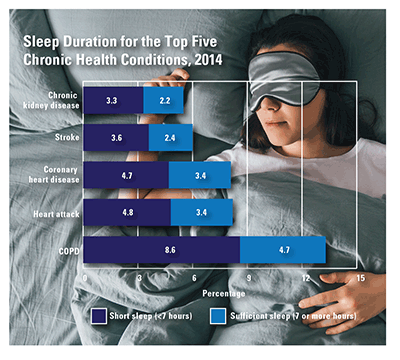US Pharm. 2019;44(1):36.
Although research has shown that adults should sleep at least 7 hours per night for optimal health, the 2014 Behavioral Risk Factor Surveillance System reported that approximately 35% of adults got insufficient sleep. Insufficient sleep in employed adults results in 1.2 million working days lost, at a cost of $411 billion (2.3% of the gross domestic product). Insufficient sleep is associated with an increased risk of various chronic diseases. Causes of insufficient sleep include lifestyle and occupational factors, medical conditions, and medications.

Occupation: According to the Standard Occupational Classification system, adults in production occupations had the highest prevalence of short sleep duration (42.9%), followed by healthcare-support personnel and healthcare practitioners (both, 40%). Among healthcare-support personnel, 43.3% of nursing, psychiatric, and home health aides were sleep deprived, and 32.8% of occupational and physical therapist assistants and aides were sleep deprived. Approximately 40% of health technologists and technicians got insufficient sleep, followed by diagnosing-and-treating health practitioners (39.7%). Adults with occupations in the “education, training, and library” and “farming, fishing, and forestry” categories had the lowest rate of short sleep duration (both, 31.3%); personal care and service providers had a rate of 37.5%.
Health Risk Factors: Compared with employed adults who regularly got sufficient sleep, those who were short-duration sleepers were more likely to be obese (33%), physically inactive (27.2%), and current smokers (22.9%). Adults getting insufficient sleep were more likely to experience chronic health conditions. There was a twofold increased prevalence of insomnia symptoms in chronic obstructive pulmonary disease (COPD) patients, and 75% of heart failure patients reported insomnia. Arthritis patients had the highest rate of short sleep duration (28.8%), followed by depression (nearly 22.9%), asthma (16.5%), diabetes (11.1%), and cancer (10.2%); chronic kidney disease had the lowest rate (3.3%).
Demographics: In employed adults, the prevalence of insufficient sleep decreased with age, from 37.7% in those aged 18 to 34 years to 29.2% in those aged 65 years and older. Prevalence was similar in persons aged 35 to 44 years and 45 to 54 years (37.6% vs. 37.4%), but there were 10% fewer cases with progression to ages 55 to 64 years (33.8%). The prevalence of short sleep duration was highest in non-Hispanic black workers (48.5%), followed by multiracial non-Hispanic (39.9%), Hispanic (37.8%), and non-Hispanic white workers (33.5%). In the workforce, 6% more men than women got insufficient sleep (37.5% vs. 35.4%). Short sleep duration was 12% less likely in married or unmarried couples (34.7%) than in persons who were divorced, widowed, separated, or never married (39.5%).
To comment on this article, contact rdavidson@uspharmacist.com.





